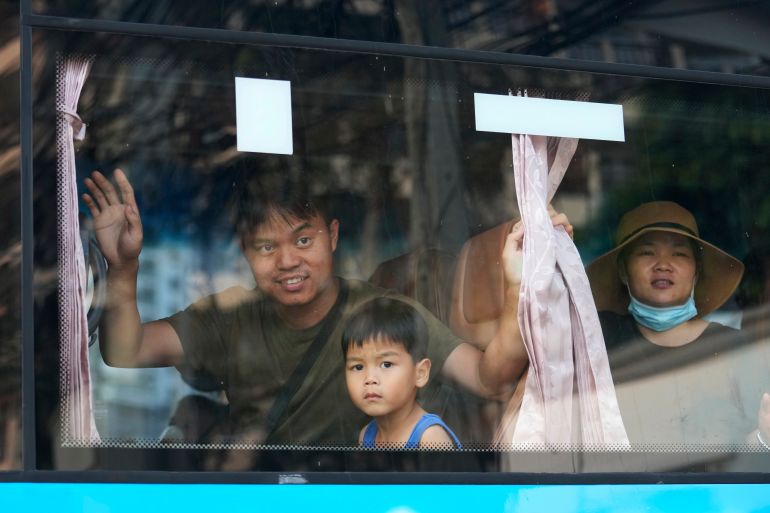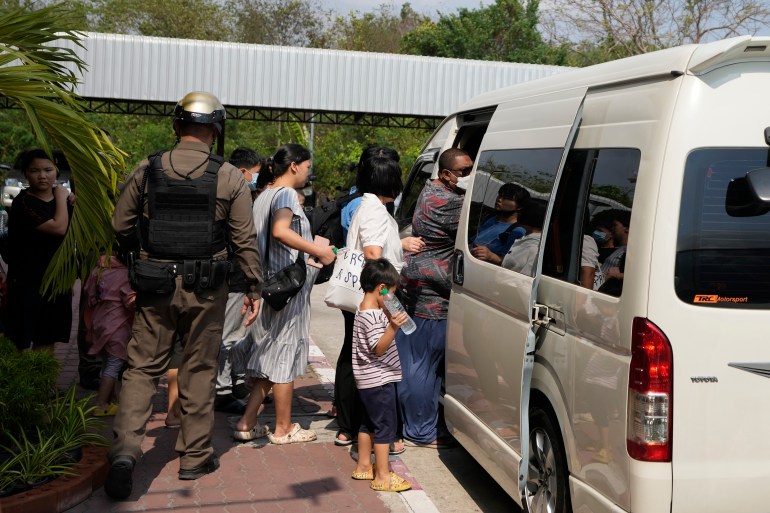Thai officials say Chinese church members to be deported soon
Members of Shenzhen Holy Reformed Church say they faced unbearable harassment in China and sought asylum in the United States.

More than 60 self-exiled members of a Chinese Christian church who were detained in Thailand after receiving UN refugee status will be deported by next week, probably to a third country, according to officials.
Deputy National Police Chief Surachate Hakparn said on Wednesday that representatives of Thailand’s Ministry of Foreign Affairs and Immigration Bureau were holding talks with the UN Refugee Agency and the US Embassy to discuss the fate of the 63 members of the Shenzhen Holy Reformed Church who were taken to court in the coastal city of Pattaya last Friday.
Keep reading
list of 3 itemsIn Thailand, Myanmar migrants’ illicit unions fight to be heard
Myanmar refugees in Thailand endure resettlement wait
“Within the next week, they will definitely be deported. What we don’t know is which country they will be deported to,” Surachate told The Associated Press.
The members of the church, also known as the Mayflower Church, were granted refugee status by the UN agency after they arrived in Thailand last year. They say they faced unbearable harassment in China and sought asylum in the United States.
Before their arrival in Thailand, the church members fled to South Korea’s Jeju Island in October 2019 and stayed there for nearly three years, but decided to leave as it became clear that prospects for refuge there were dim.
An Immigration Bureau official with knowledge of Wednesday’s multi-agency discussions said that the Thai authorities would “find a way” for the church members to be sent to a third country.
“The Immigration Bureau will continue to take care of them on humanitarian grounds in the meantime,” said the official, who spoke on the condition that he not be identified because he is not authorised to speak to the media.

The church members expected to be released after being arrested and fined last week for overstaying their visas. Instead, they were driven by bus from Pattaya to a police detention facility in Bangkok for what a police officer said was standard processing.
Surachate said the church members had been separated, with “the mothers and children” – about half the group – sent to the Immigration Bureau’s care facility in northern Bangkok. He said the others were being kept in the bureau’s main detention centre in central Bangkok.
As the group was being driven to Bangkok, the church members forced the buses to temporarily stop when they suspected they were headed to Bangkok’s international airport for repatriation to China, where they feared persecution.
‘Grave dangers’
Human Rights Watch issued a statement on Saturday urging the Thai government not to deport the group due to “the grave dangers facing Christians back in China.”
In its annual report last year, the United States Commission on International Religious Freedom said the Chinese Communist Party requires religious groups to support its rule and political objectives, including by altering their religious teachings to conform with the party’s ideology and policy. “Both registered and unregistered religious groups and individuals who run afoul of the CCP face harassment, detention, arrest, imprisonment, and other abuses,” the commission said.
Surachate said the church members had overstayed their visas by about half a year when police found them. He said they were arrested due to a recent crackdown following growing reports of crimes involving Chinese citizens.
He said Thailand has a principle of not allowing people seeking refuge to stay in the country. Thailand did not ratify the 1951 UN Refugee Convention and has no law addressing refugee status.
“Principally, we will not let them stay in Thailand, otherwise, people from all over the world would come to Thailand,” Surachate said. “You see, they were in South Korea for years and did not receive the UNHCR paper. They did within just four months of arriving here.”
Thailand has frequently granted shelter to people from neighbouring countries fleeing war.
However, not everyone has been tolerated. In 2015, Thailand deported 109 members of the Muslim Uighur minority, against their will, back to China, despite fears that they would face official persecution and possible torture.